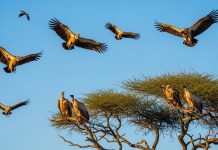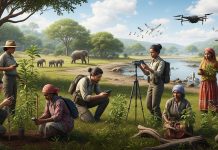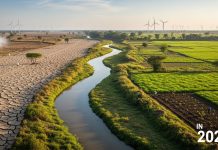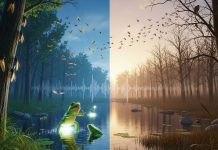Nigeria is losing its wildlife at an unprecedented rate. Uncontrolled hunting, deforestation, and weak protection efforts have pushed many of our most famous animals, lions, cheetahs, rhinos, and even gorillas to the brink of extinction. Some species have already become extinct in the wild.
When Nature Was Full of Life
In the past, Nigeria’s forests, savannas, and rivers were full of wild animals. People could see cheetahs running across the northern plains, rhinos roaming the grasslands, and lions hunting in the open. Back then, most communities believed that animals could never disappear, that nature would always replace whatever was taken.
However, that belief proved to be incorrect. Hunting for meat, trade, and trophies went on without limits. Over time, this careless use of wildlife has resulted in the country losing some of its most iconic species.
Animals That Are Already Gone
Cheetah: Once common in northern Nigeria, cheetahs have completely vanished from the wild. Their habitats have been taken over by farms and roads, and years of hunting have wiped out the few that were left.
Black Rhinoceros: Nigeria’s black rhino is a sad example of how poaching can destroy a species. By the late 1900s, none were left. Hunters targeted them for their horns, which were sold illegally for high prices.
Giraffe: Native giraffes are now gone from the wild, too, except for a few dozen kept inside Sumu Wildlife Park in Bauchi State. Only about 48 giraffes survive there, protected within fences. Without these efforts, they might have disappeared completely.
Animals That Could Soon Follow
Some of Nigeria’s most famous animals are just a few steps away from extinction:
Lion: Fewer than 50 adult lions remain in the country, mostly in Kainji Lake National Park and Yankari Game Reserve. They face threats from poachers, shrinking prey numbers, and human encroachment on their land.
Cross River Gorilla: Found only in parts of Cross River State, this rare gorilla is one of the world’s most critically endangered species. Scientists believe fewer than 100 are left. Forest destruction and illegal hunting have left them with almost nowhere safe to live.
Why Are We Losing So Much?
In the past, traditional customs helped regulate hunting. Some communities had sacred forests, hunting bans during breeding seasons, or taboos that protected certain species. However, today’s modern pressures have exacerbated the situation.
- Habitat loss: Deforestation for farming, logging, and the construction of new buildings is destroying the natural habitats of animals.
- Poaching and bushmeat trade: Many people hunt wildlife for income or food, but the pace of killing is far higher than nature can recover from.
- Weak enforcement: Although Nigeria has wildlife protection laws, many are not properly enforced due to inadequate funding, corruption, and a lack of political will.
What’s Being Done, And What’s Not Enough
Some efforts are being made. Nigeria has several national parks and reserves meant to protect wildlife. Conservation groups are working to breed and protect endangered species, such as giraffes. Awareness campaigns are also teaching people about the importance of wildlife.
However, progress is still slow. Many parks lack adequate funding, and rangers are often under-equipped and underpaid to perform their jobs effectively. In many rural areas, poverty makes hunting and land clearing more attractive than conservation.
The Future Depends on Us
If nothing changes, Nigeria could lose even more species in the next few decades. The disappearance of lions, gorillas, and other animals isn’t just a loss for nature, it’s a loss of national pride, heritage, and tourism potential.
Our generation has the knowledge and tools to stop this. Protecting wildlife means protecting our future, cleaner environments, richer biodiversity, and more opportunities for eco-tourism and education.
We must move beyond the old belief that animals will “always be there.” They won’t, not unless we act now. With stronger laws, community education, and a genuine commitment from both the government and citizens, Nigeria can still save its wildlife before it’s too late.

















